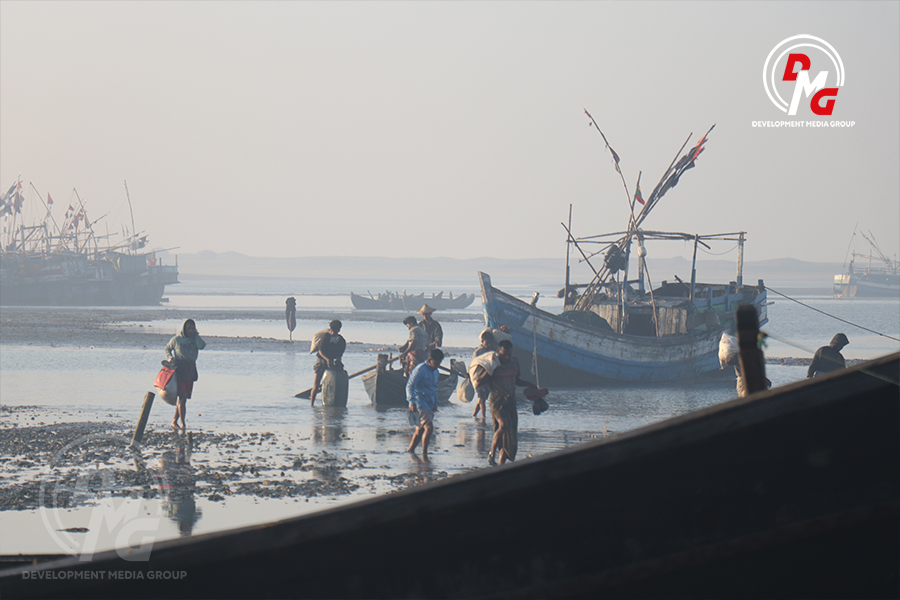- Weekly Highlights from Arakan State (Jan 26 to Feb 1, 2026)
- Arakanese youth stabbed in Mae Sot urgently needs financial aid for medical treatment
- Five years on Myanmar faces uncertain military and political outlook after coup
- Myanmar Navy detains Pauktaw fishermen and demands ransom
- Junta Airstrikes on Arakan and the Consequences for Independent Media
Number of salt farmers rises in Arakan State
The increase in salt farmers is due to the lack of alternative employment opportunities in Arakan State in the aftermath of Myanmar’s military coup and renewed fighting in Arakan State.
01 Jan 2023

DMG Newsroom
1 January 2023, Sittwe
The salt farming industry in Arakan State has shown signs of growth, according to those engaging in salt production.
There were only about 700 acres of salt farms in Arakan State prior to an increase of about 300 acres this year. The industry has been in decline for a decade, but in a potential reversal the number of salt farmers has increased from approximately 70 across 12 Arakan State townships to about 100.
The increase in salt farmers is due to the lack of alternative employment opportunities in Arakan State in the aftermath of Myanmar’s military coup and renewed fighting in Arakan State.
U Tun Kywe, secretary of the Arakan State Salt Farmers Association, said there are still challenges to salt farming in the state, such as technical difficulties and market assurance.
“Although the number of salt farms has increased, technical difficulties and the lack of markets are the main challenges for salt farmers. Arakan State’s salt production industry still has many difficulties to grow,” he said.
About a decade ago, there were almost a thousand salt farmers, but since then, there have been fewer salt farmers due to the lack of a guaranteed market.
“Sometimes the salt has to be stored for up to three years because there is no one to buy it,” said U Su Daung Chay, a salt farmer from Shwe Nyo Ma Village in Kyaukphyu Township who has been engaged in the salt farming business for more than 10 years. “We have been doing salt farming since the beginning, so we continue to do it. If the salt gets wet when it rains, it will be lost. No matter how much salt is produced, it means nothing in years when there is no market.”
Most salt farmers in Arakan State dry their salt on the ground, and because the raw salt contains impurities including sand and mud, buyers are limited. Because of this, salt farmers have said that if they are able to work with plastic sheets, a practice that is more widespread in Ayeyarwady Region, the quality will be better and market share will increase.
The cost of salt farming with plastic sheets is about K6 million per acre of salt farm, presenting a capital barrier to entry for many salt farmers.
“Salt that is sun-dried on the ground is of poor quality and does not fetch a good price in the market. The plasticised and sun-dried salt that has been used lately is of good quality and the yield has doubled. But salt farmers have financial difficulties,” U Tun Kywe said.
Out of 1,000 acres of salt farms in Arakan State, only around 200 acres are sun-dried with plastic sheets.
According to salt farmers, the price of one viss of salt dried on the ground is around K200 and one viss of salt dried on plastic sheets is up to K250.
U Kyaw Maung Thein, information officer for the Kyaukphyu Township salt farmers association, said the Arakan State Salt Farmers Association submitted a request to the State military council earlier this year urging it to help spur recovery of the salt farming business in Arakan State, in part by making it easier for salt farmers to obtain loans in order to produce higher quality salt.
But the request has not prompted government action to date, he added.
“Arakan State already has a certain amount of irrigated land for salt production, so if salt farmers can develop a salt product that can be exported abroad with the technical support needed by salt farmers, salt farming businesses in Arakan State can flourish,” U Kyaw Maung Thein said.
There were more than 10,000 acres of salt farms in Arakan State before 2000, but only about 1,000 acres of salt farms remained by 2000, according to the Arakan State Salt Farmers Association.















.jpg)

